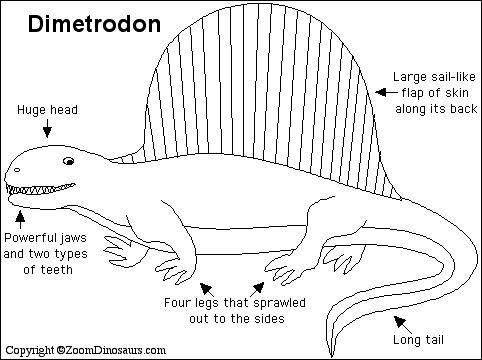
 |
| You might also like: | CAMARASAURUS - Dinosaur | Pteranodon Print-out | Dimetrodon Fact Sheet | Euoplocephalus - Dinosaur | Carnotaurus Printout- ZoomDinosaurs.com | Today's featured page: Geography (K-3) |
| More about Dimetrodon Dinosaur and Other Prehistoric Printouts |
AllAboutDinosaurs.com Dimetrodon |
Animal Printouts |


Dimetrodon was a dominant carnivore during the Permian period, living mainly in swampy areas. Unlike their fellow non-finned pelycosaurs, they warmed up early after sunrise, and cooled off more efficiently during the heat of the day. This efficient thermoregulation along with their large and powerful jaws gave them the advantage over their cohorts, making them dominant.
Anatomy: Dimetrodon was about 11.5 feet (3.5 m) long and weighed roughly 550 pounds (250 kg). It had a large sail-like flap of skin along its back, dense with blood vessels. The sail was supported by long, bony spines, each of which grew out of a separate spinal vertebra (a bone in the back). The sail may have been a thermoregulatory structure, used to absorb and release heat. The sail may have also been used for mating and dominance rituals, and/or for making Dimetrodon look much larger than it was to predators.
Fossils and Name: Dimetrodon was named by paleontologist Edward Drinker Cope. Fossils of Dimetrodon have been found in Texas and Oklahoma in the USA. Trackways (fossilized footprints) of Dimetrodon have been found in Nova Scotia, Canada.
| Search the Enchanted Learning website for: |